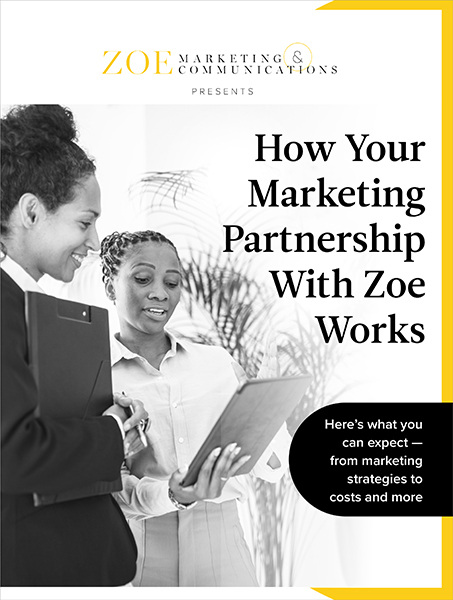
Download Your Guide to Marketing With Zoe
From the first steps and your role in success to specific services, pricing and success stories, learn all about partnering with Zoe.
Topics:
January 5th, 2023 | 2 min. read
By Kim Kovelle

You know marketing is essential for growing your business, but hiring a marketing agency can feel intimidating.
At Zoe Marketing & Communications, we speak with many small and medium-sized businesses every year who are interested in hiring an agency — but have concerns about budget, finding the right fit and contracts.
Sometimes, an agency is a great solution. Other times, it may not be the best choice. In this blog, we’ll look at some common concerns:
You’ll gain a better sense of whether working with a marketing agency is right for your business.
From the first steps and your role in success to specific services, pricing and success stories, learn all about partnering with Zoe.
Since your marketing won’t be in-house, agencies need time to learn about your brand and goals.
Onboarding typically takes about a month and involves a client needs analysis and multiple meetings to establish a clear understanding of your business, audience and current marketing strategies.
You’ll need to communicate regularly with your agency about any changes in your goals, products or services. This ongoing collaboration is key to ensuring the agency’s strategies stay aligned with your business needs.
Hiring a marketing agency requires a shift in mindset. It’s an investment, and the payoff takes time. Marketing is a long-term strategy, not an immediate fix — expect 3-6 months or more to see results.
Agencies aren’t cheap. According to WebFX, marketing agency costs range $950 and $20,000 per month. However, these rates are generally lower than hiring an in-house expert.
Over time, you’ll get a clearer idea of how much it costs to acquire a new customer, allowing you to assess the effectiveness of your marketing spend.

Not all marketing agencies offer the same services, so finding the right one takes time.
Start by reflecting on your needs:
Once you’ve narrowed down your options, research potential agencies by looking at reviews, case studies and their past work. Ask key questions during interviews to make sure they’re the right fit for your business.
Agencies manage multiple clients, so while they aim to be responsive, they may not always be available immediately.
It’s important to set clear expectations for communication and turnaround times, especially since they won’t be working for you exclusively.

Most marketing agencies require long-term contracts, which can feel daunting. However, these contracts are designed to protect both you and the agency.
The first couple of months involve a lot of foundational work, from setting up campaigns to creating content, which requires time and effort.
Agencies need time to prove their strategies work. A longer contract ensures that you both stay committed to the process, allowing marketing efforts to fully take effect over several months.
Is a marketing agency right for you? After reviewing the learning curve, cost and commitment involved, you should have a clearer idea.
If you feel ready to explore your options, talk to us at Zoe Marketing & Communications. We’ll guide you through a client needs assessment and help you determine the best path forward for growing your business.
Not quite ready? Take a look at these helpful articles:

From the first steps and your role in success to specific services, pricing and success stories, learn all about partnering with Zoe.
As Zoe Marketing & Communications’ content manager, Kim Kovelle brings over 20 years of writing and editing experience in metro Detroit. She has strong roots in community journalism and a knack for making complicated topics make more sense.
Topics:
